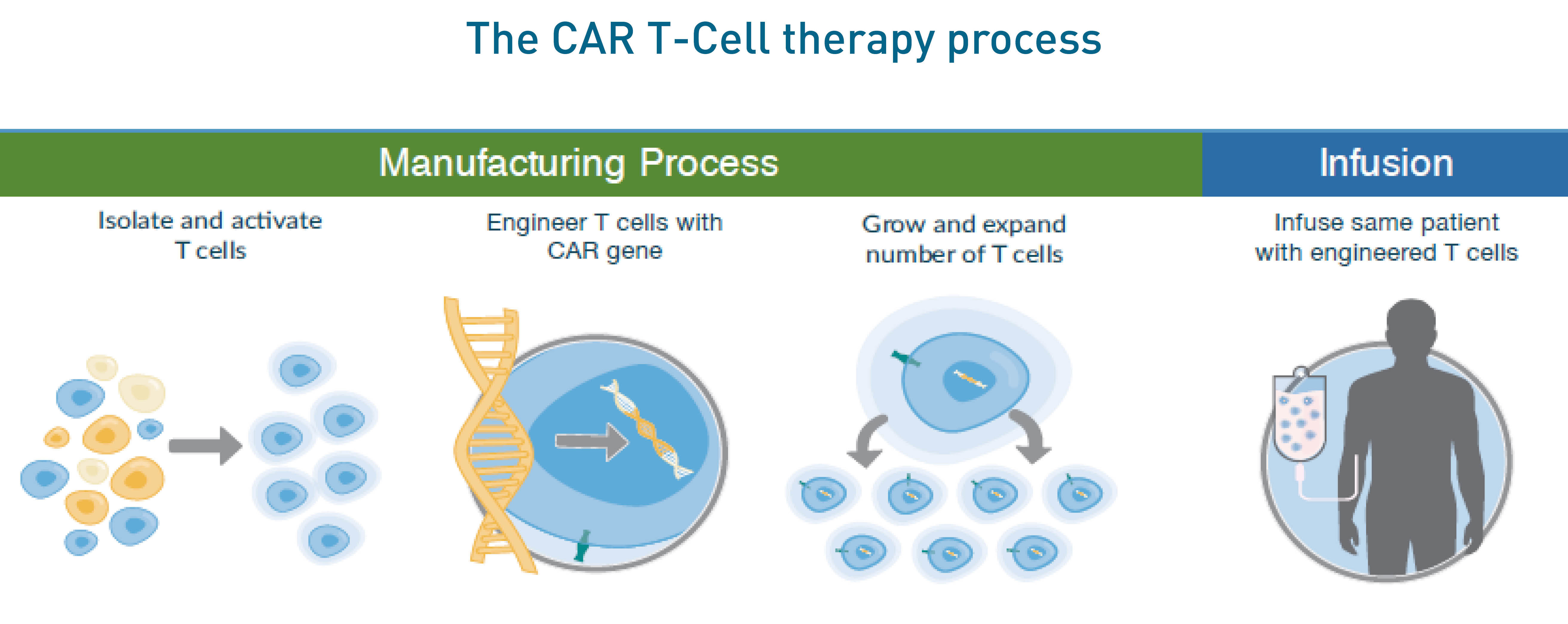CAR T-Cell Therapy Offers Lymphoma Patients the Possibility of Remission

Photo credit: Massachusetts General Hospital Cancer Center
“You have lymphoma.”
It’s hard not to anticipate the worst possible outcome when you hear those words.
Treatment hasn’t worked, and you’re out of options. But then your oncologist calls and say there’s a new treatment that looks promising. You don’t want to get your hopes up, but you are more than willing to try anything. What do you have to lose?
Chimeric antigen receptor T-cell (CAR T-cell) therapy is the first immunotherapy approved by the FDA for treating some patients with advanced blood cancers – and it can save lives.
“We generate a CAR T-cell by taking out a patient’s own lymphocytes, genetically engineer the lymphocyte to express a repressor against their cancer,” explains Jeremy Abramson, MD, clinical director at the Center for Lymphoma at the Massachusetts General Hospital Cancer Center. “So, effectively, what we’re doing is taking a patient’s own immune cell and turning it into a serial killer against their cancer.”
When a cancer patient learns there’s something out there that can kill their cancer, it’s an indescribable feeling – and not only for the patient.
“As a clinician, there’s nothing that can describe the feeling of offering potentially life-saving therapy to a patient,” says Dr. Abramson. “Particularly to a patient who’s lost a lot of hope because they’ve seen treatments tried and they’ve seen those treatments fail.”
Matthew Frigault, MD, medical oncologist and administrative director of Cellular Therapy Services at the Mass General Cancer Center, tells a story of a lymphoma patient who had held off getting married because of his uncertain future. Things changed after he received CAR T-cell therapy.
“They’re moving forward with the wedding,” Dr. Frigault says. “Because – months out – he’s hopeful that his future will no longer be weekly chemotherapy, and he and his wife can actually commit their vows to one another.”
Dr. Frigault’s patient isn’t the only one who has had a positive experience.
“When you talk about a patient who has very few options remaining and say we’ve got this new therapy that works completely differently, patients say, ‘Sign me up,’” Dr. Abramson says. “We have early evidence that it can be highly successful, and then they do it. They come out the other end in a complete remission, and they stay in complete remission.”

Image courtesy of Kite, a Gilead company
The FDA has approved two CAR T-cell drugs, and both come with high price tags. Those figures do not include pre-treatment tests, or monitoring and managing the potentially toxic side effects, such as cytokine-release syndrome (CRS). It occurs when too many cytokines (cell-signaling molecules that affect immune responses) get into the bloodstream and cause high fevers or dramatic drops in blood pressure.
Even if patients can afford the therapy, not all lymphoma patients are viable candidates.
“When we start with a new therapy, particularly something that really was considered science fiction when we started, that is something that is considered high risk,” says Marcela Maus, MD, PhD, director of cellular immunotherapy at Mass General Cancer Center.
Because of that, patients who are newly diagnosed with leukemia or lymphoma are ineligible for the therapy. A patient who has had chemotherapy (and the disease has either progressed or relapsed after the initial therapy) could become eligible for CAR T-cell therapy. Imagine what a game changer this new therapy can be to the cancer patient who has tried everything else.
“It transcends being a physician. It’s about being a human being, witnessing people’s hopes and dreams.” says Dr. Abramson. “To be a part of helping to make that happen for them is extraordinary. It’s really quite humbling.”
Physicians and researchers at Mass General Cancer Center are rightfully optimistic.
“In my view, cellular therapy offers the hope and potential for eradicating chemotherapy for the primary treatment modality for cancer,” Dr. Frigault says. “There’s a lot of excitement and backing to do this, and the Mass General Cancer Center is committed. I think we’re going to see a lot of interesting and exciting things coming out of here.”
For more video interviews with our CAR-T therapy experts, click here.
For more information about CAR T-cell therapy to treat adult patients with relapsed or refractory large B-cell lymphoma, contact the Massachusetts General Hospital Cancer Center.
This is a paid partnership between Mass General Cancer Center and Boston Magazine


